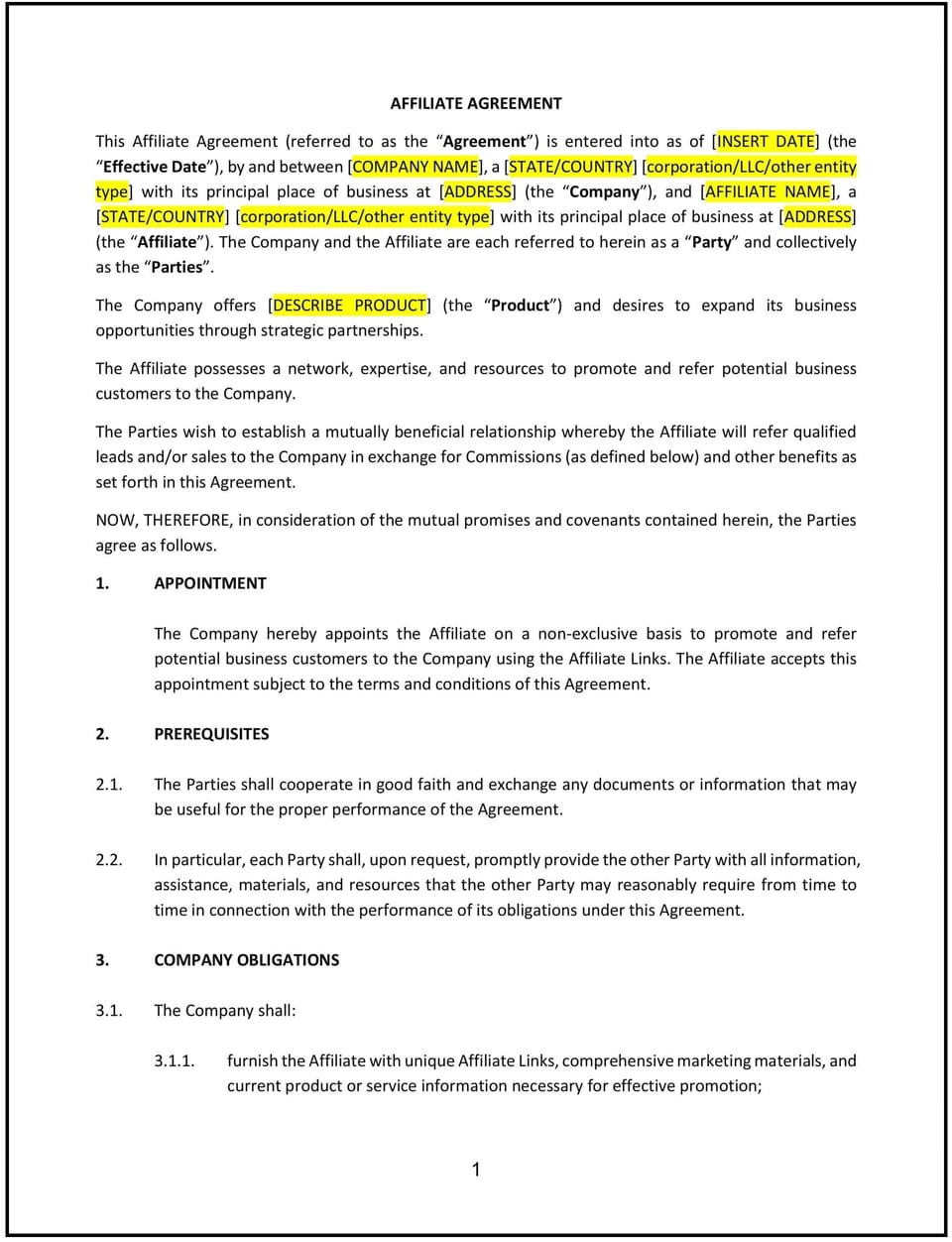Affiliate Agreement (New Mexico): Free template

Affiliate Agreement (New Mexico)
An Affiliate Agreement is a legally binding contract between a business (the "Merchant" or "Advertiser") and an affiliate (the "Affiliate" or "Publisher") that outlines the terms under which the Affiliate promotes the Merchant’s products or services in exchange for compensation. In New Mexico, Affiliate Agreements are commonly used in industries such as e-commerce, digital marketing, agriculture, healthcare, and tourism. New Mexico’s adherence to the Uniform Commercial Code (UCC) and its consumer protection laws provide a solid foundation for drafting and enforcing such agreements.
For example, an Albuquerque-based retailer might use an Affiliate Agreement to partner with influencers to promote its fashion line, while a Santa Fe-based health and wellness brand might collaborate with affiliates to expand its customer base. A carefully crafted Affiliate Agreement ensures clarity on commission structures, promotional guidelines, and alignment with New Mexico’s legal framework.
Tips for drafting and maintaining an Affiliate Agreement in New Mexico
- Clarify the nature of the relationship: Specify that the Affiliate operates as an independent contractor and not as an employee or agent of the Merchant. This distinction is critical in New Mexico, where worker classification is governed by state labor laws.
- Example: “The Affiliate is an independent contractor and does not have the authority to represent the Merchant or bind it in any way.”
- Define approved promotional methods: Identify the channels and strategies the Affiliate may use to promote the Merchant’s products, such as social media, blogs, email campaigns, or paid advertisements. Ensure the agreement aligns with New Mexico’s Unfair Practices Act, which prohibits deceptive trade practices.
- Example: “The Affiliate may promote the Merchant’s products through approved marketing channels, including social media and blogs, but must avoid any tactics that could be considered misleading or deceptive.”
- Establish payment terms: Clearly outline how the Affiliate will be compensated, whether through a percentage of sales, flat fees, or other arrangements. Include payment schedules, reporting procedures, and conditions for earning commissions. Transparency in pricing and payment terms builds trust and fairness.
- Example: “The Affiliate will earn a 10% commission on all verified sales generated through their referral link, payable within 30 days of the end of each month.”
- Address intellectual property rights: Specify the ownership of trademarks, logos, and other branding materials provided by the Merchant. Ensure the agreement respects federal and New Mexico state laws regarding intellectual property rights.
- Example: “All intellectual property provided by the Merchant, including trademarks and logos, remains the exclusive property of the Merchant and must be used in accordance with the guidelines provided.”
- Set performance benchmarks: Include minimum performance standards, such as generating a certain number of leads, clicks, or sales, to ensure the Affiliate actively promotes the Merchant’s products. Performance metrics should be realistic and clearly defined to avoid disputes.
- Example: “The Affiliate agrees to generate at least 50 qualified leads per quarter or risk termination of this agreement.”
- Provide termination provisions: Define the circumstances under which the agreement can be terminated, such as breach of terms, failure to meet performance benchmarks, or mutual consent. Include steps for winding down the partnership, such as ceasing the use of promotional materials.
- Example: “Either party may terminate this agreement with 15 days’ written notice if the other party fails to comply with the terms outlined herein.”
- Align with New Mexico laws: Ensure the agreement adheres to New Mexico’s contract laws, including the New Mexico Uniform Commercial Code (UCC) for transactions involving goods. Additionally, address compliance with consumer protection statutes and data privacy regulations.
Frequently asked questions (FAQs)
Q: Is an Affiliate Agreement enforceable in New Mexico?
A: Yes, as long as the agreement is clear, reasonable, and complies with New Mexico contract laws, it is legally enforceable. Including specific terms and signatures from both parties strengthens its validity.
Q: What essential components should an Affiliate Agreement include in New Mexico?
A: It should include the scope of the relationship, promotional methods, commission structure, intellectual property usage, performance benchmarks, termination clauses, alignment with New Mexico laws, and dispute resolution mechanisms.
Q: Can an Affiliate Agreement be ended early in New Mexico?
A: Yes, if the agreement includes a termination clause, either party can terminate the agreement with reasonable notice. The terms should specify the conditions and procedures for termination.
Q: What industries frequently use Affiliate Agreements in New Mexico?
A: Industries such as e-commerce, digital marketing, agriculture, healthcare, tourism, and retail frequently use Affiliate Agreements in New Mexico. For instance, a Taos-based outdoor adventure company might partner with affiliates to promote vacation packages.
Q: How can businesses ensure compliance with New Mexico laws in Affiliate Agreements?
A: Businesses should ensure their agreements align with New Mexico’s contract laws, including the UCC and consumer protection statutes. Regularly reviewing and updating the agreement is also crucial to maintain alignment with evolving legal standards.
This article contains general legal information and does not contain legal advice. Cobrief is not a law firm or a substitute for an attorney or law firm. The law is complex and changes often. For legal advice, please ask a lawyer.


